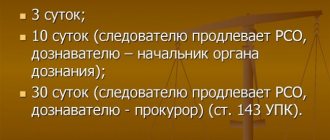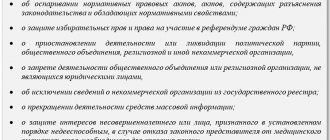ST 161 of the Criminal Code of the Russian Federation.
1. Robbery, that is, the open theft of someone else’s property, is punishable by compulsory labor for a term of up to four hundred eighty hours, or correctional labor for a term of up to two years, or restriction of liberty for a term of two to four years, or forced labor for a term of up to four years. , or arrest for a term of up to six months, or imprisonment for a term of up to four years.
2. Robbery committed: a) by a group of persons by prior conspiracy; b) has become invalid; c) with illegal entry into a home, premises or other storage; d) using violence that is not dangerous to life or health, or with the threat of using such violence; e) on a large scale - is punishable by forced labor for a term of up to five years, or by imprisonment for a term of up to seven years, with or without a fine in the amount of up to ten thousand rubles or in the amount of the wages or other income of the convicted person for a period of up to one month, and with restriction of freedom for a term of up to one year or without it.
3. Robbery committed: a) by an organized group; b) on an especially large scale, - c) has become invalid, - shall be punishable by imprisonment for a term of six to twelve years with or without a fine in the amount of up to one million rubles or in the amount of the wages or other income of the convicted person for a period of up to five years, and with or without restriction of freedom for a term of up to two years.
Commentary to Art. 161 Criminal Code
1. Robbery as a form of theft is characterized by the open theft of someone else's property.
2. Open in accordance with paragraph 3 of the Resolution of the Plenum of the Supreme Court of the Russian Federation dated December 27, 2002 N 29 “On judicial practice in cases of theft, robbery and robbery” is recognized as theft that is committed in the presence of the owner or other owner of the property or on in the mind of strangers, when the person committing this crime is aware that those present understand the illegal nature of his actions, regardless of whether they took measures to suppress these actions or not. The openness of theft is assessed according to a subjective criterion: theft will be considered open if, in the opinion of the perpetrator, it is obviously illegal in the eyes of those around him.
3. The moment of completion of the crime coincides with a similar moment in relation to the theft of someone else’s property.
4. The qualifying signs of robbery (parts 2 - 3) generally coincide with similar signs of Article 158 of the Criminal Code of the Russian Federation.
The use of violence that is not dangerous to life or health (clause “d” of Part 2) should be understood as beatings or other violent acts associated with causing physical pain to the victim or restricting his freedom (tying his hands, using handcuffs, leaving him in a closed room). premises, etc.) (clause 21 of the Resolution of the Plenum of the Supreme Court of the Russian Federation of December 27, 2002 No. 29). The threat of such violence covers a real and present threat of beatings or other violent actions associated with causing physical pain to the victim or restricting his freedom.
In this case, the object of violence (threat) can be the owner, another owner of the property, their relatives (by influencing whom the perpetrator is trying to influence the owner or holder), as well as persons who are preventing or, in the opinion of the perpetrator, can prevent the theft. Accordingly, violence applied “to property” (for example, tearing off a hat, snatching a bag) does not qualify robbery as violent.
In addition, the violence used (threat) must be a means of taking possession or retaining someone else's property immediately after taking it; if, after a secret theft, the perpetrator uses violence (threat) in order to avoid arrest, then the act is qualified as theft with possible qualification in conjunction with Art. 116 of the Criminal Code (clause 3 of the Resolution of the Plenum of the Supreme Court of the USSR of September 5, 1986 N 11 “On judicial practice in cases of crimes against personal property”).
Passive indifference
If a teacher doesn’t hit a child’s head on a desk, doesn’t scream, doesn’t call children “idiots,” does this mean that we have an excellent teacher? No, before us is just a teacher who does not commit actions for which he could one day lose his job. The fact is that at school the teacher has power, and therefore has in his arsenal a lot of opportunities for bullying children, which at first glance are not at all obvious. How might this manifest itself?
Advertising on Forbes
Most often, teachers simply do nothing. They silently watch as one of the children is consistently bullied in their class. In the 90s, there were common cases when, during a lesson, the school attendants called a student into the corridor, supposedly for some important matter, but immediately at the office they were pressed against the wall and assigned to “shoot in the yard after school.” Many have watched the series “School” by Guy Germanicus, in which all this is shown quite truthfully. Nowadays there are security guards and even cameras in schools, but children will always find ways to hide this from adults. A Barnaul resident (and journalist) told on Facebook how her son was met every day after school by his peers, beaten with pieces of ice, and not given the opportunity to go home. The story received wide publicity, and what is typical is that the school principal and teachers deny everything, despite the fact that the boy’s beatings were officially recorded. Both a post on social networks (that is, making it public) and contacting the police are just an example of what parents need to do if their child is being bullied, and teachers condone this bullying. First of all, you need to talk with the principal and class teacher, and if the teachers at school do not hear you and begin to blame you and your child for the current situation, you need to fight further: write to the local Department of Education, on social networks, contact local media. Many parents are afraid to do this, so that it doesn’t get worse, so that the child doesn’t get a bad grade because of such parental activity, so that he doesn’t look like a “black sheep.” But I suggest asking yourself the question: could things get worse?
Actually it can. The teacher has another way to use his power - agree with the parent, but behave with the child as before, demonstrating to him in every possible way that the parents will not help here. Recently, a story from one of the provincial schools was discussed on social networks, where a mother asked the Russian language teacher to let her second-graders go to recess, and not force them to complete assignments that they did not have time to complete in class. The next day, the teacher pointedly sent one child to recess, while the rest of the class continued to finish their assignments. All this was accompanied by comments: “You are tired, you need a change, go rest.” The next day this boy was bullied by the whole class. Yes, precisely because he is not like everyone else. It’s good if the child has a trusting relationship with his parents, and he talks about this. If not, then teachers can do everything to make your complaint work against you, they say, look how helpless you are, and we are the power here. What should parents do in such cases? It is very important to talk with your child, discuss every day how things are going at school, and not limit yourself to questions about grades. Children need to know that we are always on their side, no matter what happens.
Second commentary to Art. 161 of the Criminal Code of the Russian Federation
1. The objective side of robbery is characterized by open, non-violent seizure of someone else's property. Open “is theft that is committed in the presence of the owner or other holder of property or in full view of strangers, when the person committing this crime is aware that those present understand the illegal nature of his actions, regardless of whether they took measures to suppress these actions or not” (clause 3 of the resolution of the Plenum of the Supreme Court of the Russian Federation dated December 27, 2002 No. 29).
2. Theft, which began as a secret theft, can develop into an open one if in the process of taking possession of property the thief is noticed, but he, ignoring this circumstance, continues his criminal actions and now openly takes possession of the property. The crime is considered completed from the moment the property is actually confiscated and the perpetrator has the opportunity to use it or dispose of it in any other way at his own discretion (clause 6 of the same resolution).
3. The subjective side of robbery is characterized by direct intent, the content of which includes, in particular, the awareness that the theft of someone else’s property is committed openly, in front of other persons who understand the criminal nature of the actions of the perpetrator.
4. The subject of the robbery is a person who has reached the age of 14 years.
5. Three qualifying features of robbery (clauses “a”, “c” and “e” of Part 2) coincide with the qualifying features of theft of the same name. But in relation to robbery, penetration into a home, premises or other storage facility has a qualifying value only if the culprit, even before the invasion, had the intention to steal someone else's property in an open way. In case of robbery, breaking into a home has the same legal meaning as breaking into a building or other storage facility.
During robbery, violence or the threat of violence that is not dangerous to life or health (clause “d”, part 2) can be applied not only to the owner or other owner of the property, but also to other persons who, in reality or in the opinion of the perpetrator, could prevent the theft . Violence that is not dangerous to life or health is understood as any physical impact on the victim, committed against or against his will, or other actions that limit his physical freedom, which do not cause harm to the health of the victim and do not by their nature pose a danger to the health of the victim .
6. Robbery is qualified as violent only if the use or threat of violence served as a means of taking possession of property or retaining it immediately after taking it. Therefore, the violence that the kidnapper uses to avoid arrest after the theft is completed does not turn it into robbery.
7. Particularly qualified robbery (Part 3 of Article 161 of the Criminal Code) is characterized by its commission by an organized group or on a particularly large scale. They have the same content as the previously discussed forms of theft.
What to do if your phone is taken away
If schools take away phones, then you shouldn’t just leave it like that. Especially in the case when the teacher took the gadget and does not give it back throughout the entire school day. Teachers should not take advantage of their position and infringe on the rights of students by taking away their property without permission.
Of course, you don’t need to immediately solve the problem radically and write a statement to the police. First, you should try contacting the teacher or the management of the educational institution. Quietly, peacefully and without scandals, explain that children’s smartphones should not be touched.
Most likely, they will meet you halfway, because the law is on your side in any case. And for a teacher, serious proceedings will, at a minimum, end in a reprimand, and at maximum, in dismissal. It’s hardly worth ruining a person’s career for a minor offense; no one is perfect, and everyone makes mistakes.
It is important to understand that the problem here is not only with the teacher, but also with the student who provoked such a reaction. He clearly doesn’t care about his lessons, since he prefers the screen of his smartphone instead of classes and a blackboard. And a teacher has practically no legal ways to influence a student when he has become completely insolent and does not respond to comments at all.
If you are a parent, then you should have a serious conversation with your child and explain where you can use a smartphone and in what places you should not do this under any circumstances. Well, if you are a student, then remember - it is really important to protect your rights, but it is equally important to be conscientious. Therefore, leave gadgets for change, they will not go away from you. And devote the lessons to what they are intended for - gaining knowledge.
Comments for the site
Cackl e





